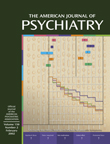Clozapine and Suicide
To the Editor: Michael J. Sernyak, M.D., et al. (1) reported that they found no evidence that clozapine reduces the rate of suicide and rejected the evidence from other authors that clozapine reduces the rates of suicide attempts and completions. Their arguments for rejecting the findings of the previous studies require careful scrutiny. Dr. Sernyak et al. claimed that there was no control group in the study by Meltzer and Okayli (2), in which the rate of suicide attempts in the 2 years after clozapine treatment was initiated was 86% less than in the same patients in the 2 years before they began taking clozapine. Thus, each patient acted as his or her own comparison subject. Although this design is not as robust as a randomized, parallel-group, double-blind study, it is incorrect to describe it as having no comparison group. Moreover, the statement that the decrease in the rate of suicide attempts could represent regression to the mean needs clarification because there is no evidence that the mean rate of suicide attempts was higher than normal in the period before the subjects started taking clozapine.
Dr. Sernyak et al. also incorrectly characterized the study by Walker et al. (3) as having no “control group of similar patients not exposed to clozapine” and as employing a comparison group of patients who had stopped taking the medication and who would have been expected to “have a poorer clinical outcome” (1, p. 931). The comparison group in the study by Walker et al. (3) comprised patients who had recently begun taking clozapine, a clear indication of similarity with those who continued to take clozapine. There was no evidence to support the authors’ conclusion that the patients who stopped taking clozapine were at greater risk for suicide. The standardized mortality rate of the comparison group (13.9) was well within the expected limits for patients with schizophrenia. The standardized mortality rate for the patients treated with clozapine was 2.27, which falls well outside the confidence interval of that for patients with schizophrenia, which has been reported to range from 9 to 20 in most studies.
Next, Dr. Sernyak et al. dismissed the data from Reid et al. (4), which showed that the rate of suicide in clozapine-treated patients in the Texas Department of Mental Health and Mental Retardation was 12.7 out of 100,000 compared to 60–63 out of 100,000 of those not treated with clozapine, with the argument that no data were presented for basic demographic factors, such as age, gender, and race. There was no evidence that these differed in the two groups. The authors also failed to include a study by Munro et al. (5), who reported that the standardized mortality rate in the entire Clozaril National Registry in Great Britain was 4.98, compared with a standardized mortality rate of 20 from other published studies of the general schizophrenia patient group. Both Meltzer and Okayli (2) and Reid et al. (4) reported similar data from the U.S. Clozaril National Registry from two different time periods. It is remarkable that all six of these studies showed a 75%–86% decrease in the rates of suicide attempts or completions after clozapine treatment. It is noteworthy that Dr. Sernyak et al. found a nearly significant effect of clozapine in reducing the rate of suicide in those who took clozapine for part, let alone, all of the period that they were at risk.
1. Sernyak MJ, Desai R, Stolar M, Rosenheck R: Impact of clozapine on completed suicide. Am J Psychiatry 2001; 158:931-937Link, Google Scholar
2. Meltzer HY, Okayli G: Reduction of suicidality during clozapine treatment of neuroleptic-resistant schizophrenia: impact on risk-benefit assessment. Am J Psychiatry 1995; 152:183-190Link, Google Scholar
3. Walker AM, Lanza LL, Arellano F, Rothman KJ: Mortality in current and former users of clozapine. Epidemiology 1997; 8:671-677Crossref, Medline, Google Scholar
4. Reid WH, Mason M, Hogan T: Suicide prevention effects associated with clozapine therapy in schizophrenia and schizoaffective disorder. Psychiatr Serv 1998; 49:1029-1033Link, Google Scholar
5. Munro J, O’Sullivan D, Andrews C, Arana A, Mortimer A, Kerwin R: Active monitoring of 12,760 clozapine recipients in the UK and Ireland: beyond pharmacovigilance. Br J Psychiatry 1999; 175:576-580Crossref, Medline, Google Scholar



